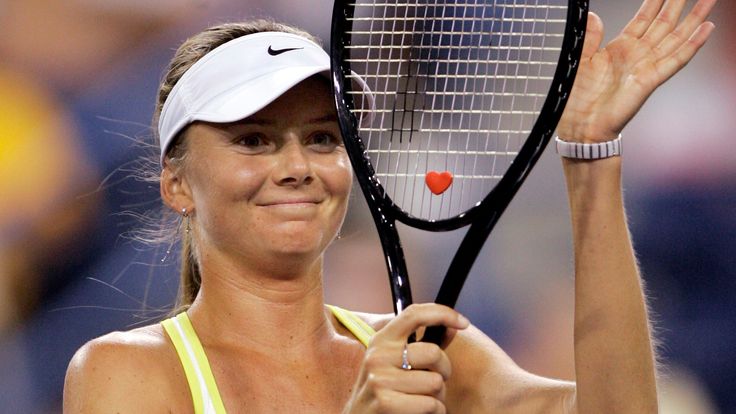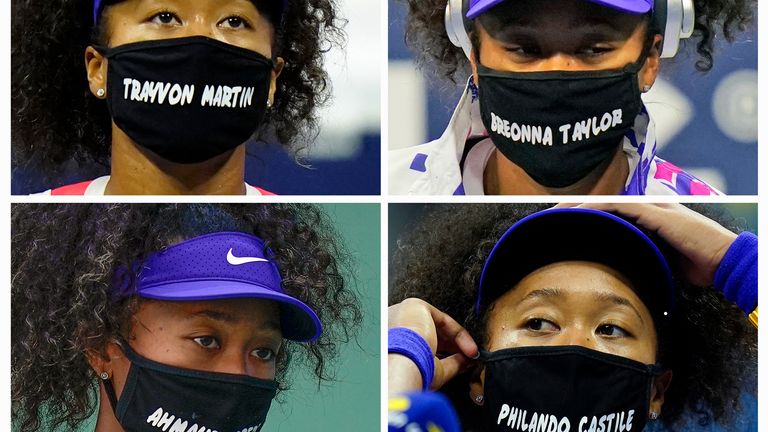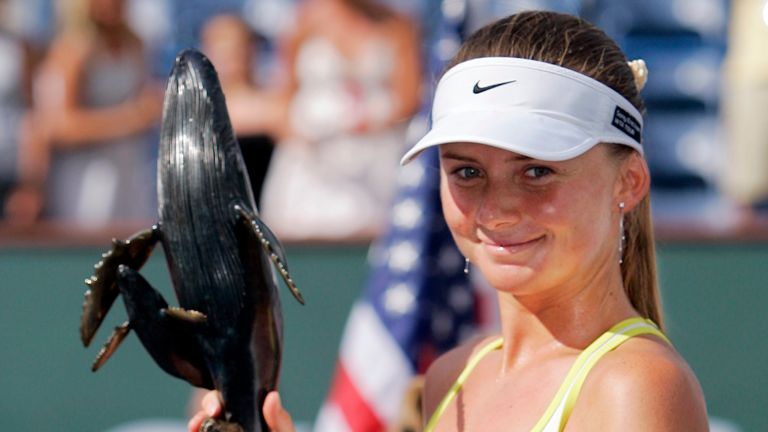Naomi Osaka and female players using their platform, Daniela Hantuchova talks all things tennis
Former women's tennis World No 5 Daniela Hantuchova discusses Naomi Osaka's impact off the court, the importance of female players speaking out and unearthing the lighter side of tennis in her podcast

Sunday 31 January 2021 07:08, UK
Naomi Osaka became a beacon for the growing authority of women's sport this year as she accompanied on-court success by positioning herself at the forefront of the fight for social justice across the globe.
The 23-year-old, who is of Japanese and Haitian heritage, was a leading voice in demanding reform as the police killings of Breonna Taylor and George Floyd and shooting of Jacob Blake thrust America's long-standing issue of systemic racism back into the spotlight.
Osaka honoured the names of seven victims of police brutality on seven different face masks for each of the seven rounds on her way towards winning the US Open in September. In using her platform to call for change she accepted the baton as the modern face of 'The Original Nine' who, led by Billie Jean King, famously took an unprecedented stand against the disparity in prize money and opportunities for women in professional tennis in 1970.
In an age of unrelenting and often suffocating social media attention, with major sponsors and endorsement deals in play and female sport, while having made progress, still subject to unjust perceptions, Osaka's unflinching public stand was the kind perhaps less likely to be seen 10 to 15 years ago.
"I think it just shows her mental strength because to be brave and go out there and speak your heart out, that's going to take a lot of energy out of her," TV analyst Daniela Hantuchova told Sky Sports.
"And being able to back it up with the results she had on the court in the States at the same time shows what a wonderful young grown-up lady she has become and she's definitely very strong on the court, off the court and again another wonderful inspiration in women's tennis."
In a column for the Washington Post, King hailed athletes for 'risking their careers' by addressing social issues, citing a constant pressure to be careful with her actions during her career in order to avoid triggering backlash.
Alongside Osaka, Serena Williams was also among those to campaign for racial equality, and has previously spoken out against domestic abuse as well as addressing maternal healthcare and mothers in the workplace, while teenage star Coco Gauff released a powerful social media video supporting the Black Lives Matter movement.
Madison Keys strived to tackle cyber-bullying by launching KindnessWins.org, and Nicole Gibbs, a previous voice on global warming, equal prize money and gun laws, joined others in challenging Australian Open organisers over a lack of information surrounding safety amid poor air quality.
"I think it's very important given tennis is the leading women's sport in the world," added Hantuchova. "It's wonderful to see that these girls are using their platform to make the difference and that they're not scared about getting criticised and it just shows the personality they have as players, they're able to transfer that to their off-court actions as well.
"I think so many young people can take motivation from that that it's so important to always stay true to yourself and how big or small the attention is going to be, you take responsibility for that and you're not afraid to say what you feel or what you think."
Having burst onto the scene as a teenager in the early 2000s, Hantuchova endured scrutiny over her slight frame along with pressure to build on an incredible breakout year in 2002 that had seen her beat Martina Hingis in the final at Indian Wells as the lowest-ranked player to ever win the tournament, before reaching the quarter-finals at Wimbledon and the US Open and winning the Fed Cup with Slovakia.
The former women's World No 5, who reached the semi-finals of the Australian Open in 2008 and completed the career Grand Slam in mixed doubles in 2005, admitted upon retiring in 2017 that she had felt weighed down by the expectations and external views.
Looking back, she underlined the importance in caring only about her own self-assessment rather than the opinions around her, an attitude Osaka and co. have channelled admirably.
"There are always going to be bad comments," she said. "Nobody is going to be liked by everybody, 100 per cent. So I think, at least personally, that's what helped me when I realised that 'okay, nobody is perfect, I'm nowhere near it, I don't expect anybody else to me'.
"I think it's important having a say in the world and trying to have a difference, but at the end of the day just to be content with who we are as a person. Whether it's a man or a women, it wouldn't make a difference. It's more about personally just looking at how I can be the best version of myself. That's pretty much it.
"What I struggled with at the beginning was those comments where I took everything so personally and I wanted to be liked by everybody.
"But like I said, I realised that's not possible and that's what I'm here for, I'm here to be the best tennis player I can possibly be and best person, best sister, best daughter, best girlfriend I can possibly be, that's all I can do. Other than that, that's not in my control."
- No changes to quarantine rules for Aus Open players
- Judy Murray: London 2012 made me feel like I didn't matter
The growing influence of female athletes is coinciding with the upward trajectory of women's sport and its ongoing pursuit of equal treatment.
As the coronavirus pandemic threatened to derail the 2020 sporting calendar, Roger Federer called on the men's and women's governing bodies to merge, while elsewhere the Digital, Culture, Media and Sport Committee (DCMS) criticised the lack of funding for women's elite sports, highlighting a concerning disparity in the rescheduling of COVID-disrupted men's sporting events compared to that of their female counterparts.
Hantuchova acknowledges the continued existence of negative comments surrounding women's sport and its athletes, but believes there has been notable progression in the overall perception.
"I think definitely women's sports are respected much more these days, but I have to say I've been really lucky, maybe because of the people around me, that I never felt like I've been treated differently or anything else on a personal level," she said.
Since stepping away from competing the 37-year-old has asserted herself as a talented and widely-respected analyst while working as a pundit and commentator for Amazon Prime, in doing so representing another valuable influence in the continued push for greater gender balance in the broadcast industry.
"Funnily enough I started my first year covering just men's tennis and that was a good challenge for me," she explained. "That's maybe when I felt a little bit like 'okay let's see how much she knows about men's tennis' and I think I was able to prove right away that I know what I'm talking about.
"And I've been very lucky with my colleagues and the people I've been working with that I was very welcome."
Television evidently presented itself as a logical avenue for Hantuchova, who had been accustomed to the media side of things since an early age.
"I was used to having the cameras around me basically from the age of 13/14, I always felt comfortable around that so when the TV opportunity came I didn't really have to think for too long.
"It takes a lot of adjustment, even though it's the same sport it's a different job and suddenly you go from being in an individual sport to having 30/40 people telling you what to do, adjusting to the time schedule, the long days and for any professional individual athlete it's a big adjustment so it took a lot of energy but I'm really glad I stuck with it and I started to enjoy it from the first opportunity I had."
The seven-time WTA tournament winner has also expanded her media ventures into her own project, launching a podcast series entitled 'The Real DNA' back in April.
Her star-studded list of guests since then has included the likes of Andy Murray, CEO of Tennis Australia Craig Tiley, Roger Federer's former coach Ivan Ljubicic, former women's world No 1 Garbine Muguruza and the legendary Chris Evert.
In his appearance on the show Murray details that he has been involved in over 800 press conferences since the beginning of his career, admitting that the regularity of them combined with the effort to avoid saying the wrong thing are a reason for what might be deemed as reserved answers when speaking to the media.
Hantuchova's aim is to shed light on the true personalities and untold stories of individuals that inspire her, such as Murray.
"I'm not really interviewing people I'm just chatting with my friends," she said. "It's been really nice because I really love to hear that they open up to me in a really cool, relaxed way because literally we're just having coffee and chatting about views on life and how I see things.
"I think that's one of the things that people love to see more, the real athletes and their personalities. That's why it's called DNA, it's about their real values and the way they are deep down under.
"At the end of the day if people can take something useful for their life, some inspiration and have a little bit of fun, which is important in these tough times, that's always been the main goal of that. It's been a beautiful journey so far."
Don't forget to follow us on skysports.com/tennis, our Twitter account @skysportstennis & Sky Sports - on the go! Available to download now on - iPhone & iPad and Android





